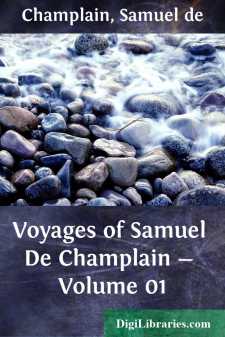Categories
- Antiques & Collectibles 13
- Architecture 36
- Art 48
- Bibles 22
- Biography & Autobiography 813
- Body, Mind & Spirit 142
- Business & Economics 28
- Children's Books 17
- Children's Fiction 14
- Computers 4
- Cooking 94
- Crafts & Hobbies 4
- Drama 346
- Education 46
- Family & Relationships 57
- Fiction 11829
- Games 19
- Gardening 17
- Health & Fitness 34
- History 1377
- House & Home 1
- Humor 147
- Juvenile Fiction 1873
- Juvenile Nonfiction 202
- Language Arts & Disciplines 88
- Law 16
- Literary Collections 686
- Literary Criticism 179
- Mathematics 13
- Medical 41
- Music 40
- Nature 179
- Non-Classifiable 1768
- Performing Arts 7
- Periodicals 1453
- Philosophy 64
- Photography 2
- Poetry 896
- Political Science 203
- Psychology 42
- Reference 154
- Religion 513
- Science 126
- Self-Help 84
- Social Science 81
- Sports & Recreation 34
- Study Aids 3
- Technology & Engineering 59
- Transportation 23
- Travel 463
- True Crime 29
Voyages of Samuel De Champlain - Volume 01
Categories:
Description:
Excerpt
CHAPTER I.
PARENTAGE—BIRTH—HOME AT BROUAGE—ITS SITUATION—A MILITARY STATION—ITS SALT WORKS—HIS EDUCATION—EARLY LOVE OF THE SEA—QUARTER-MASTER IN BRITTANY—CATHOLICS AND HUGUENOTS—CATHERINE DE MEDICIS—THE LEAGUE—DUKE DE MERCOEUR—MARSHAL D'AUMONT—DE SAINT LUC—MARSHAL DE BRISSAC—PEACE OF VERVINS
Champlain was descended from an ancestry whose names are not recorded among the renowned families of France. He was the son of Antoine de Champlain, a captain in the marine, and his wife Marguerite LeRoy. They lived in the little village of Brouage, in the ancient province of Saintonge. Of their son Samuel, no contemporaneous record is known to exist indicating either the day or year of his birth. The period at which we find him engaged in active and responsible duties, such as are usually assigned to mature manhood, leads to the conjecture that he was born about the year 1567. Of his youth little is known. The forces that contributed to the formation of his character are mostly to be inferred from the abode of his early years, the occupations of those by whom he was surrounded, and the temper and spirit of the times in which he lived.
Brouage is situated in a low, marshy region, on the southern bank of an inlet or arm of the sea, on the southwestern shores of France, opposite to that part of the Island of Oleron where it is separated from the mainland only by a narrow channel. Although this little town can boast a great antiquity, it never at any time had a large population. It is mentioned by local historians as early as the middle of the eleventh century. It was a seigniory of the family of Pons. The village was founded by Jacques de Pons, after whose proper name it was for a time called Jacopolis, but soon resumed its ancient appellation of Brouage.
An old chronicler of the sixteenth century informs us that in his time it was a port of great importance, and the theatre of a large foreign commerce. Its harbor, capable of receiving large ships, was excellent, regarded, indeed, as the finest in the kingdom of France. [1] It was a favorite idea of Charles VIII. to have at all times several war-ships in this harbor, ready against any sudden invasion of this part of the coast.
At the period of Champlain's boyhood, the village of Brouage had two absorbing interests. First, it had then recently become a military post of importance; and second, it was the centre of a large manufacture of salt. To these two interests, the whole population gave their thoughts, their energy, and their enterprise.
In the reign of Charles IX., a short time before or perhaps a little after the birth of Champlain, the town was fortified, and distinguished Italian engineers were employed to design and execute the work. [2] To prevent a sudden attack, it was surrounded by a capacious moat. At the four angles formed by the moat were elevated structures of earth and wood planted upon piles, with bastions and projecting angles, and the usual devices of military architecture for the attainment of strength and facility of defence....




